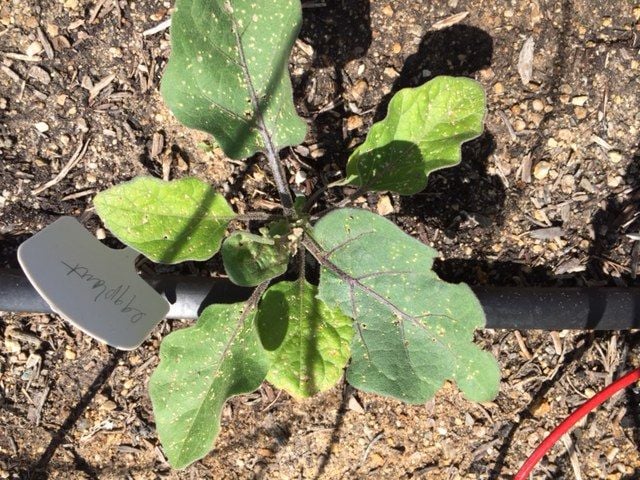Q: Thanks for the bug lesson last weekend at the Jewish Community Center. Thanks to you, I was able to identify lace bugs on our sunflowers (you predicted they would show up) and I mitigated with blue Dawn. While there, I noticed that our Japanese eggplant have something going on with them. Are you able to help out based on the two images I am including? No insects were visible.
A: Flea beetles are eating your eggplant leaves. They are tiny and hard to see, and they tend to jump like fleas when they sense danger. They are one of the most difficult-to-manage pests of eggplant and cole crops. They are also a problem on seedlings of tomatoes, potatoes, peppers, turnips, radishes and corn. There are various species of flea beetles, all members of the Chrysomelidae family. The adults are active leaf-feeders that can, in large numbers, rapidly defoliate and kill plants. You are seeing the symptoms of adult flea beetle feeding: small, rounded, irregular holes that make leaves look as if they had been peppered with fine shot. Additional damage may be done by the larvae, which feed on plant roots. Some flea beetles are considered general feeders, though many species attack only one plant or closely related kinds of plants. Because of this you can sometimes use anther crop to lure them away. For example, radishes are sometimes preferred over eggplant. Another tactic is to put yellow sticky traps near your plants to attract and capture these insects. Organic products that have some effectiveness are insecticidal soap and neem oil. Pyrethrin products such as Pyganic as well as hot pepper wax and rotenone are reported to be better.
No matter what you choose, the most important things to do are spray them early in the season before they do too much damage to young plants and read the label before you use these products so you are aware of safety precautions for using them.
Peter L. Warren is the urban horticulture agent for the Pima County Cooperative Extension and the University of Arizona. Questions may be emailed to




